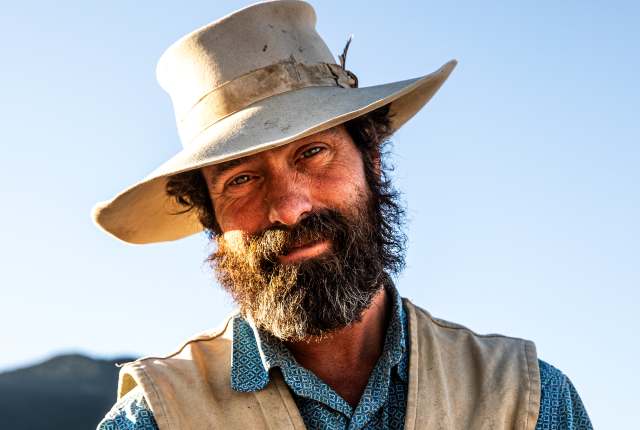IN MAY 2019, WILL GRANT AND HIS PARTNER, CLAIRE ANTOSZEWSKI, drove more than 700 miles from their home in Santa Fe to St. Joseph, Missouri, with Grant’s two horses, Chicken Fry and Badger, in tow. The Outside magazine contributor and lifelong horseman planned to travel the same route as the riders of the Pony Express, the storied mail trail through the West that lasted from April 3, 1860, to October 24, 1861. Over the next five months, Grant journeyed 2,000 miles by horseback, sleeping outside with his horses, accepting help when it was available, and bringing as much food and water as Chicken Fry and Badger could carry through the harsh landscape. The former working cowboy crossed the farms and grasslands of Kansas and Nebraska, through Wyoming and the sparse deserts of Utah and Nevada, before finally making his way into California. Grant chronicled his trip in a new book, The Last Ride of the Pony Express, out now from Little, Brown and Company.
HORSES have always been a grounding presence for me—something that takes you away from all your other anxieties.
THERE’S SOMETHING ABOUT being around the animals, and the dust, and the dirt, and the hay, and the water. It’s a very elemental relationship.
I HAVE A PHOTOGRAPH OF MYSELF taken in 1981. I was two years old, on a horse named Buster at the family ranch. My dad’s dad bought a ranch in Steamboat Springs, Colorado. That’s where I learned to ride.
I WAS IMPRESSED by horses in a way that no other animal has done for me.
I’VE LOOKED TO LEVERAGE my horse expertise, because between college and journalism school, I trained horses. I had a lot of a working knowledge of horses. So I was like, How do I make this work?
I WANTED TO WRITE A BOOK about the West—the big picture. The Pony Express became the avenue for me to do that.
THE PONY EXPRESS has cast a long shadow in our historical memory. It’s digestible, palatable. It’s easily understood. It means exactly what it implies.
IT HAS A PHYSICAL PRESENCE on the land. It starts in St. Joseph, Missouri, and it ends in Sacramento, California. It was laid out for me. I didn’t have to make any decisions about where I was going.
ONE THING that the Pony Express trip really did for me is give me perspective on the West.
I WAS INTERESTED IN how our recent history affects our current psyche—how the historical West, the Old West, and the Pony Express inform our sense of identity today.
I WOULD MEET THESE PEOPLE and I would ask myself, What is the context of this person? How do they contribute to the larger canvas of the West? How do they fit into this? What is their job? What does their environment look like? Where do they get their water? How much water do they use?
THERE’S THIS SENSE of independence.
IT’S A SUBTLE VIBE most of the time. It’s like an undercurrent—independence within an environment that shapes the people. There’s not much water out West. So it’s a combination of the environmental factors and the geographical factors. There’s isolation—long distances between towns, a lot of open land, big landscapes.
IT WAS LIKE A DREAM COME TRUE—sleeping with my horses every night, waking up before dawn every morning, seeing every sunset. My daily routine was just distilled down to basic elements and basic needs and wants.
I TALKED TO THE HORSES ENDLESSLY. I was telling the funniest jokes in the world. And I would sing to them, and I would just talk out loud, have conversations with them. Those were the best days.
ME, ALONE WITH MY HORSES, was really timeless. There were some nights I’d have trouble going to sleep because I’d be so excited.
IT WAS THE BEST five months of my life.
SEE FOR YOURSELF
Follow Will Grant (@willgrantofthewest) on Instagram, or purchase The Last Ride of the Pony Express at hachettebookgroup.com.


